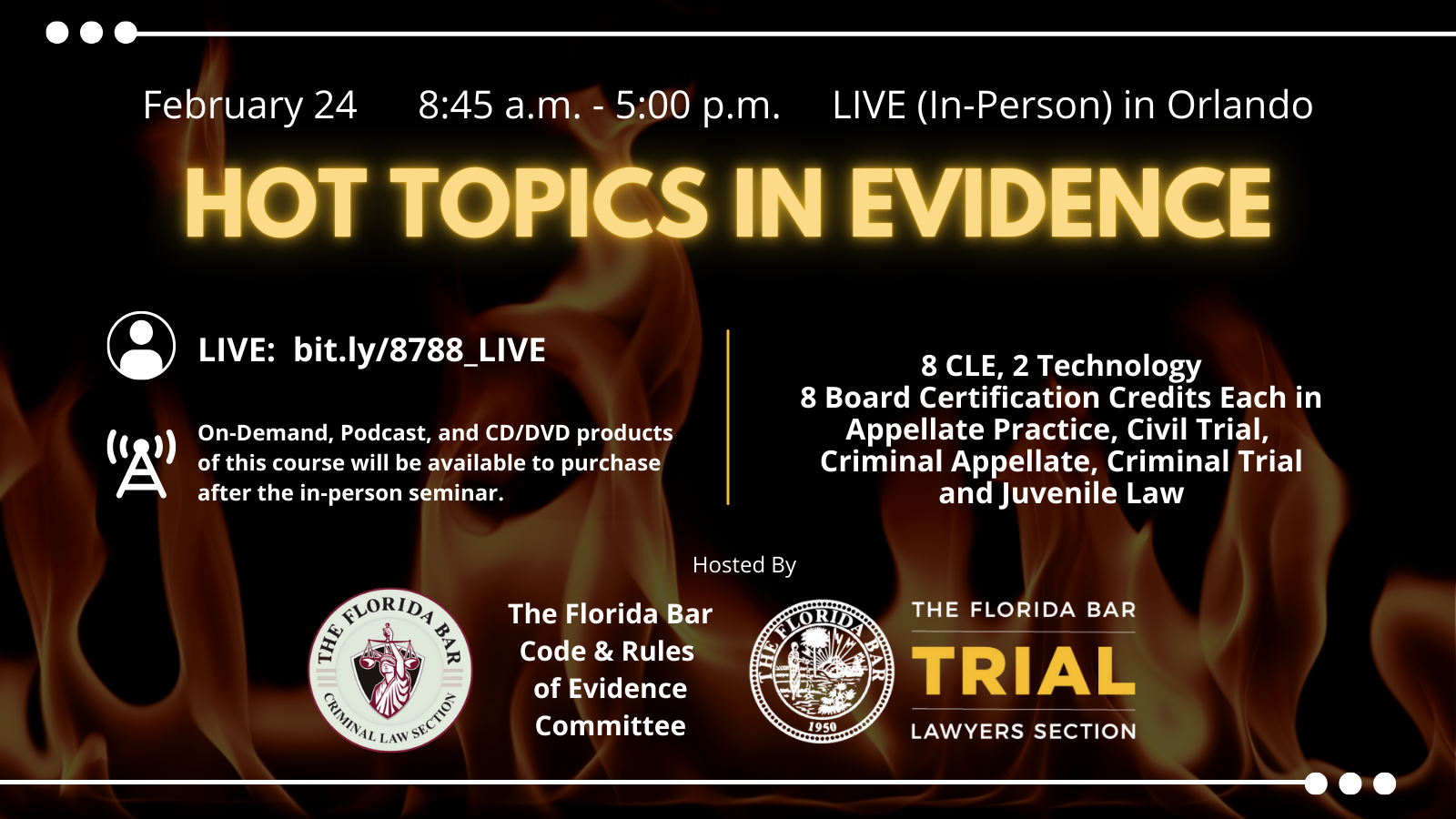

24 February, 2025 @ 8:45 am - 5:00 pm
| $235Originally presented on February 24, 2025, live (in person) at the Orange County Bar Association in Orlando. Course number 8788 is approved for: 8 CLE, 2 Technology, and 8 board certification credits each in Appellate Practice, Civil Trial, Criminal Appellate, Criminal Trial, and Juvenile Law. Hosted by The Florida Bar Criminal Law and Trial Lawyers Sections.
This one-day seminar has been designed to appeal to civil, criminal, and appellate practitioners. Those in attendance will benefit from a thorough discussion of the latest developments in Florida evidence law, and an exploration of difficult, recurring evidentiary issues.
Course Level: Advanced. This course’s on-demand, podcast, audio CD, and video DVD products will be available to purchase the week following the in-person seminar.
AGENDA AND PRESENTERS
| TIME | SESSION DESCRIPTION |
| 8:45-9:00 | Welcome Remarks |
| 9:00-9:50 | Application of the Daubert Standard in Florida
Aaron Kelley, Esq. & Patrick Montoya, Esq. This one-hour session will focus on how Florida criminal and civil courts have applied the Daubert analysis in determining the reliability and relevance of expert witness testimony. The session will be led by seasoned practitioners in civil and criminal courts and will discuss the five “reliability” prongs of the Daubert standard along with strategic approaches for (1) challenging the admissibility of an opposing party’s proposed expert evidence and (2) ensuring your expert’s testimony holds up against a Daubert challenge. |
| 10:00-10:50 | Hearsay You Say? On Keeping the Present Sense Impression and Excited Utterance Exceptions
Speaker to be confirmed This session will delve into exceptions to hearsay— present sense impressions and excited utterances—and the differences between the two exceptions. |
| 11:00-11:50 | Unregulated Character Evidence
Speaker to be confirmed When can character evidence of the defendant can be introduced? When can character evidence of the plaintiff can be introduced? This presentation will dive into pertinent traits of character as defined by section 90.404, Florida Statutes. How does “Williams Rule” evidence come into play? |
| 12:00-1:00 | LUNCH PROVIDED ONSITE |
| 12:20-1:00 | Admissibility of Remote Testimony and Digital Signatures
Speaker to be confirmed COVID impacted the legal profession in many ways, but one of the most significant changes is the ability to testify remotely. Requiring courts to permit court proceedings to occur through electronic means allows witnesses to testify without coming to the courthouse. What are the best practices for exchanging exhibits, for ensuring witnesses who are laying the predicate for evidence have a copy of the evidence, ensuring your witness has the necessary technology to be able to participate? Wet ink versus audit trails: this presentation will detail the case law that established the binding nature of digital signatures. Haire v. Fl. Dept. of Agric. and Consumer Servs., 870 So.2d 774 (Fla. 2004); IO Moonwalkers, Inc. v. Banc of Am. Merch. Servs., LLC, 814 S.E.2d 583 (N.C. Ct. App. 2018); Newton v. Am. Debt Servs., 854 F.Supp.2d 712 (N.D. Cal. 2012). |
| 1:00-1:50 | Preservation of Evidentiary Errors for Appellate Review
Mihaela Cabulea, Esq. & Michael Ufferman, Esq. The first thing an appellate court will review is whether the error in question was properly preserved at the trial court level, and unfortunately numerous cases each year are rejected on preservation grounds before the appellate court even reaches the merits of the case. This presentation will provide tips on how to properly preserve claims for appeal. Mihaela Cabulea will discuss what must be done to preserve particular types of claims in civil cases, and Michael Ufferman will discuss what must be done to preserve particular types of claims in criminal cases. |
| 2:00-2:50 | Generative AI in Legal Practice
Philip Asher Gold, Esq. & Carlos J. Martinez, Esq. Presentation will answer the questions “what is generative artificial intelligence” and how does it impact the court system? Lawyers use AI to assist with legal research and contract review. Doctors use AI when creating clinical patient summaries. This presentation will address ethics opinions from the bar, Federal law, evidentiary concerns, and ways in which AI can be helpful to lawyers and the court system.
|
| 3:00-3:50 | Expert Witness Fees
Speaker to be confirmed Speaker will discuss the interplay between Rule Regulating The Florida Bar 4-3.4, section 92.231, Florida Statutes, as well as pertinent case law regarding fees for expert witnesses. Can an expert witness be reimbursed for travel time? How about the time needed to prepare to testify? |
| 4:00-4:50 | Case Law Update Post-HB 837
Andrew A. Harris, Esq. & Grace Streicher, Esq. This presentation will discuss the changes that have occurred with the implementation of HB 827, including changes to what medical expenses can be presented to the jury, how letters of protection are now treated, the impact of “unbundling” of CTP codes. The presenters will highlight the changes to the legal practice caused by HB 837. |
| 4:50-5:00 | Closing Remarks |
Save the dates
